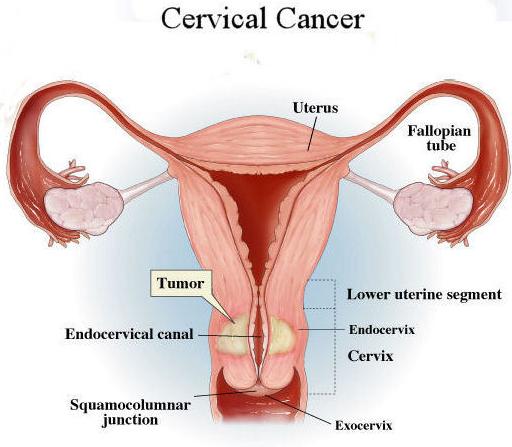What is cervical cancer?
It is the cancer of the entrance or mouth of the uterus(womb). It is a common cancer in women and if not detected early it can be fatal.

What causes cervical cancer?
It is caused by a virus called human papilloma virus(HPV) which is transmitted through sexual contact. There are many subtypes of the virus. It infects the cells of the cervix and causes abnormal changes in them,which if untreated and persistent can develop into cancer.
How can cervical cancer be prevented?
Cervical cancer can be prevented by regular screening with the PAP smear test which is done in the out patient clinic. In this test the cells on the surface of the cervix are scraped and sent for testing to identify any abnormal changes. Testing for cancer causing HPV virus can be done along with the PAP test. In this way the precancerous stage can be identified and treated to prevent the development of cancer.
Who should have PAP smear test and how frequently?
PAP test is recommended once every 3 years in all sexually active women aged 21-65 years.
If any result is abnormal then more frequent testing may be required.
After 30 yrs if HPV testing is done along with pap smear then 5 yearly testing is adequate.
If the pap smear is abnormal what is the next step?
In this case the gynecologist may recommend a further test called colposcopy and a biopsy may be taken if necessary. This is to confirm the presence of abnormality before any treatment is undertaken.
If precancerous changes are confirmed then a procedure known as LEEP/LLETZ(shaving off the abnormal area) may be advised.
If early cancer is detected it can be effectively treated and cured.
Is there any other method to prevent cervical cancer?
A vaccine against high risk subtypes of HPV is also available to prevent cervical cancer.it can be taken from 9-26 years of age. Ideally it should be taken before the first sexual contact but can give protection even if taken later.
Should women who have received HPV vaccine undergo PAP smear screening?
Vaccine does not protect against all the subtypes of HPV but only against the most high risk ones.So it does not prevent all cervical cancer.Hence women who have received the vaccine should still undergo regular screening though they are at much lower risk of developing cervical cancer.
